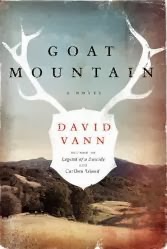Among our favorite
ex-pat Alaskans, David Vann recently released the book he deems his best, Goat Mountain. Booklist agrees, calling it “his
finest, most contemplative work to date.” As the starred review in
Library Journal notes, “Alaska-born Vann experienced catastrophic family
violence in his past, and his work has returned to this theme again and again,
this being his most ambitious exploration of the subject.”
ex-pat Alaskans, David Vann recently released the book he deems his best, Goat Mountain. Booklist agrees, calling it “his
finest, most contemplative work to date.” As the starred review in
Library Journal notes, “Alaska-born Vann experienced catastrophic family
violence in his past, and his work has returned to this theme again and again,
this being his most ambitious exploration of the subject.”
Three years ago, Vann led our first 49 Writers Retreat at Tutka Bay. From among several noteworthy sessions, here are some of Deb Vanasse’s
notes from his lecture on language, based on a selection by Annie Proulx, who’ll
be the keynote speaker at the 2014 AWP Conference in Seattle.
notes from his lecture on language, based on a selection by Annie Proulx, who’ll
be the keynote speaker at the 2014 AWP Conference in Seattle.
- Listing
is a great way to compress content; an epic convention (from Greek and
Roman) – compresses content, collapses time. Also doesn’t fill in time. Sentence fragments. - You
can divide the English language into grammar and content. Morphemes not the same as words – they
are the building blocks.
Grammatical parts organize; content parts are what Proulx (opening
pages of The Shipping News) leaves in – nouns, adjectives, and active
verbs. She converts verbs to
adjectives. Using words as other
than their normal parts of speech:
this makes language fresh.
Becomes foregrounded – readers tend to be automatons. Cliches are bad b/c we get only the
literal meaning. Poor writers –
readers can just skim. As soon as
something’s outside of its usual position – you’re required to pause. - Style
is choice. There are different ways
to present something: the kinds of
sentences, whether things are foregrounded and not in their usual
spots. Style is the combination of
choices – syntax, phonology, lexicon; voice is the combination of that and
the sensibility (attitude toward the world) – voice is bigger. - Basic
distinctions of style: language
divides into Anglo-Saxon (Germanic) and Latinate lexicon and meter. Each has its own vocabulary and metrical
properties. 1066 is the most
important date in English literature.
Latinate meter in Aeniad is accentual syllabic (dactile: heavy
stress, two soft stresses).
Metrical line arranged by the kind of metrical pattern in each foot
plus the number of syllables.
Everything declined and marked.
Sentence order didn’t matter – much more flexible than Germanic,
which had only accentual meter: two
heavy stresses and then two more (number of syllables doesn’t
matter). Poets can use either
paired heavy stresses (accentual meter) or iambic pentameter (Latin) to
satisfy readers. - Chaucer
– first to write verse in Middle English instead of Latin or French. Class divide in our language: German is low; refined is French
(example: cow v. beef). Instinctive class divide can be used for
jokes: Latinate sentence with crude
German word thrown in for fun.
(Ex: mad libs – swaps
content with grammar; not fun to switch out grammar). Grammar is our glue and we can’t process
if grammar is switched. Double
heritage: high/low vocab; double
metric schemes. Language use –
simplify distinctions; tough words go away. Hymns forced full ideas into single
lines – destroyed language over time.
English made difficult sounds vanish; French – we’ve shortened sounds. Chaucer’s initial lines: Latin meter. Over time, lost vowels, lost
aspirations. Language deteriorates,
but English is still the beefiest. - Annie
Proulx is one of our best stylists.
She matches style to content.
In first two pages, she heaps up content, cuts out grammar. Favoring content over grammar, favoring
Germanic over Latinate. These two
pages are among David’s favorite in contemporary writing. Emphasis and foregrounding in last
sentence on page 3, providing a snapshot of the rest of the book – theme. Points of emphasis are about the meaning
of the book and the character. Similar
moment to Faulkner: this sentence
tells us how to read the rest of the book; it will work through the
landscape. The book is a love
story. The sludge could be his
thoughts, but it could also be his heart.
We get some sympathy for Quoyle.
We can’t reduce it to a one-to-one correspondence. Syntactic departure – David’s theory is
that the beautiful is not just in content, but it’s created by
syntax. There are road signs to
beauty.
For a study of
voice and its impact on writing, Deb Vanasse will be teaching a four-week workshop “Sound and Fury: Find and Free Your Writer’s Voice,” beginning Oct. 17.
voice and its impact on writing, Deb Vanasse will be teaching a four-week workshop “Sound and Fury: Find and Free Your Writer’s Voice,” beginning Oct. 17.

